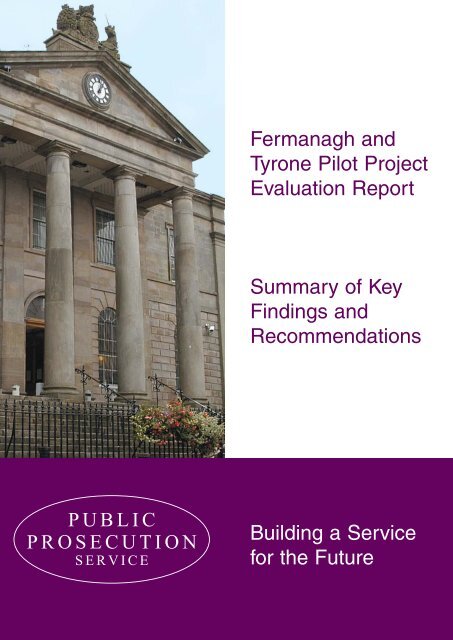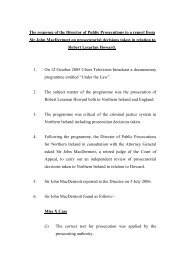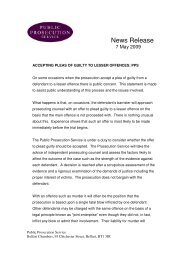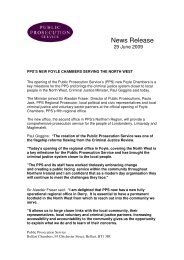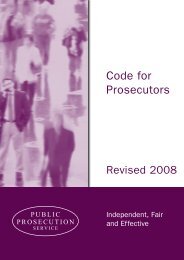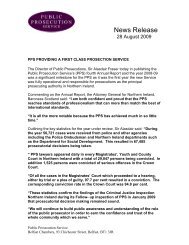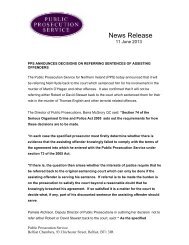Fermanagh Tyrone Pilot Summary - Public Prosecution Service
Fermanagh Tyrone Pilot Summary - Public Prosecution Service
Fermanagh Tyrone Pilot Summary - Public Prosecution Service
Create successful ePaper yourself
Turn your PDF publications into a flip-book with our unique Google optimized e-Paper software.
<strong>Fermanagh</strong> and<br />
<strong>Tyrone</strong> <strong>Pilot</strong> Project<br />
Evaluation Report<br />
<strong>Summary</strong> of Key<br />
Findings and<br />
Recommendations<br />
Building a <strong>Service</strong><br />
for the Future
Contents<br />
1. <strong>Fermanagh</strong> and <strong>Tyrone</strong> Project 1<br />
1.1 The <strong>Public</strong> <strong>Prosecution</strong> <strong>Service</strong> (PPS) 1<br />
1.2 Implementation Project 3<br />
1.3 What is the purpose of the <strong>Fermanagh</strong> and <strong>Tyrone</strong> <strong>Pilot</strong> Project? 3<br />
1.4 Operational Comparisons between the Belfast <strong>Pilot</strong> and the <br />
<strong>Fermanagh</strong> and <strong>Tyrone</strong> <strong>Pilot</strong><br />
4<br />
1.5 How many staff were in the <strong>Fermanagh</strong> and <strong>Tyrone</strong> <strong>Pilot</strong> Project? 5<br />
1.6 What was the workload of the <strong>Fermanagh</strong> and <strong>Tyrone</strong> <strong>Pilot</strong> Project 6<br />
2. Assessment of the <strong>Fermanagh</strong> and <strong>Tyrone</strong> <strong>Pilot</strong> Project 8<br />
2.1 Who conducted this evaluation? 8<br />
2.2 Factors Impacting <strong>Fermanagh</strong> and <strong>Tyrone</strong> <strong>Pilot</strong> 8<br />
2.3 What worked well within the <strong>Fermanagh</strong> and <strong>Tyrone</strong> <strong>Pilot</strong> Project? 9<br />
2.4 What did not work well within the <strong>Fermanagh</strong> and <strong>Tyrone</strong> <br />
<strong>Pilot</strong> Project?<br />
11<br />
2.5 What areas need further development? 12<br />
3. Moving Forward 14<br />
3.1 What recommendations arose from this evaluation? 14<br />
3.2 Next Steps 14<br />
Annex A<br />
Key Recommendations<br />
16<br />
<strong>Summary</strong> of Key Findings and Recommendations
1<br />
<strong>Fermanagh</strong> and <strong>Tyrone</strong> Project<br />
1.1 The <strong>Public</strong> <strong>Prosecution</strong> <strong>Service</strong> for Northern Ireland (PPS)<br />
1.1.1 The Review of the Criminal Justice System in Northern Ireland (2000) was set up as a<br />
result of the Belfast Agreement in 1998. This political agreement provided for a “...<br />
wide-ranging review of criminal justice (other than policing and those aspects of the<br />
system relating to the emergency legislation) to be carried out by the British<br />
Government through a mechanism with an independent element, in consultation with<br />
the political parties and others”.<br />
1.1.2 The Criminal Justice Review (CJR) states that the aims of the criminal justice system<br />
set out by parties to this political agreement:<br />
“…formed the starting point for our work, and the touchstone against which we<br />
have measured all the proposals we considered and the recommendations we<br />
make. These aims are to:<br />
• Deliver a fair and impartial system of justice to the community;<br />
• Be responsive to the community’s concerns, and encouraging community<br />
involvement where appropriate;<br />
• Have the confidence of all parts of the community; and<br />
• Deliver justice efficiently and effectively.”<br />
1.1.3 These aims have since been endorsed by the Criminal Justice Board which<br />
includes the heads or senior representatives of the main statutory criminal justice<br />
organisations. The Board is chaired by the Director of Criminal Justice in the<br />
Northern Ireland Office.<br />
1.1.4 The CJR made a total of forty-nine recommendations in relation to the <strong>Prosecution</strong><br />
<strong>Service</strong>, with the cornerstone of these being:<br />
“…the creation of a single fully independent prosecution service responsible<br />
for undertaking all criminal prosecutions headed by the Director of <strong>Public</strong><br />
<strong>Prosecution</strong>s to build upon the work of the existing department.”<br />
1.1.5 An implementation team, within the Department of the Director of <strong>Public</strong><br />
<strong>Prosecution</strong>s, was established and a project to design and implement the new <strong>Public</strong><br />
<strong>Prosecution</strong> <strong>Service</strong> (PPS) commenced in December 2001. The <strong>Public</strong> <strong>Prosecution</strong><br />
<strong>Service</strong> was established as a statutory body on 13 June 2005.<br />
1.1.6 The <strong>Service</strong> Delivery Model articulates the vision of the new <strong>Public</strong> <strong>Prosecution</strong><br />
<strong>Service</strong> for Northern Ireland in terms of:<br />
• The services the PPS will provide;<br />
• To whom these services will be provided;<br />
<strong>Summary</strong> of Key Findings and Recommendations<br />
Page 1
• When these services will be provided; and<br />
• How these services will be provided.<br />
1.1.7 The <strong>Service</strong> Delivery Model was developed in order to provide a common goal for all<br />
parties involved in the project which truly and accurately reflected both the guiding<br />
principles and the specific recommendations of the Criminal Justice Review in addition<br />
to addressing a range of corporate issues.<br />
1.1.8 The PPS will be:<br />
• Responsible for reaching decisions to prosecute or not to prosecute and for<br />
the conduct of criminal proceedings in all cases investigated by a police force<br />
in Northern Ireland or other appropriately constituted investigating authority<br />
(e.g. Government Department).<br />
• Headed by the Director of <strong>Public</strong> <strong>Prosecution</strong>s for Northern Ireland. The role<br />
of the Director (and the Deputy Director) and their relationship with the<br />
Attorney General for Northern Ireland is defined in the Justice (NI) Act 2002.<br />
• Subject to continuous and independent review by Criminal Justice Inspection<br />
Northern Ireland.<br />
1.1.9 The aim the PPS will be:<br />
To provide the people of Northern Ireland with an independent, fair and<br />
effective prosecution service.<br />
1.1.10 The PPS will process approximately 65,000 cases per annum. There will be 580 staff<br />
(which equates to a four-fold increase on previous staffing levels within the<br />
Department of the Director of <strong>Public</strong> <strong>Prosecution</strong>s).<br />
1.1.11 The PPS will be a regionally based organisation<br />
(see regional map). There will be four<br />
regions each coterminous with one or more<br />
court divisions.<br />
1.1.12 Each of the four regions will be managed by<br />
a Regional Prosecutor. The Regional<br />
Prosecutor will have overall responsibility for<br />
the decision making in investigation files<br />
and for the conduct of all prosecutions in<br />
that region (with the exception of those files<br />
that are considered by prosecutors in<br />
Headquarters).<br />
1.1.13 There will be six regional offices in total across Northern Ireland. Each of these local<br />
offices will offer a full range of services.<br />
Page 2
1.2 Implementation Project<br />
1.2.1 As part of the Implementation Project it was decided to run a series of <strong>Pilot</strong> Projects.<br />
It was envisaged that each <strong>Pilot</strong> Project would perform three key functions:<br />
i. Validate and refine the <strong>Service</strong> Delivery Model and the associated detailed<br />
processes and procedures in a ‘laboratory’ environment;<br />
ii.<br />
Provide a ‘model office’ for the new <strong>Public</strong> <strong>Prosecution</strong> <strong>Service</strong> to be used for<br />
internal and external references; and<br />
iii. Support the rolling implementation of the new <strong>Public</strong> <strong>Prosecution</strong> <strong>Service</strong> –<br />
with an on-going programme of induction and training to be delivered in parallel<br />
with the phased introduction of each element of the new service.<br />
1.2.2 The first pilot was the Belfast <strong>Pilot</strong> (based on South Belfast Police District), which was<br />
evaluated in summer / autumn 2004. The key purpose of this pilot was to ensure<br />
that the model developed ‘on paper’ to handle the envisaged increase in ‘prosecution<br />
file’ workload (comprised of amended business processes, revised policies, enhanced<br />
technology and modified staffing arrangements) could actually work effectively and<br />
efficiently in practice.<br />
1.3 What is the purpose of the <strong>Fermanagh</strong> and <strong>Tyrone</strong> <strong>Pilot</strong> Project?<br />
1.3.1 The <strong>Fermanagh</strong> and <strong>Tyrone</strong> <strong>Pilot</strong> went ‘live’ on 4 April 2004. The purpose of the pilot<br />
was to test the PPS processes in a rural environment and to review the operation of<br />
the model across a greater geographical area. The lessons learned were to inform the<br />
future roll out of the PPS and to provide additional validation for the <strong>Service</strong> Delivery<br />
Model.<br />
1.3.2 Due to problems encountered in securing suitable regional accommodation, there was<br />
a need to revise the structure of the office locations. A decision was made to split<br />
the processes and have two sites:<br />
• Front Office: Omagh Courthouse, Omagh - to undertake court facing<br />
activities; and<br />
• Back Office: Clarendon House, Belfast - to undertake case direction,<br />
preparation and support work.<br />
1.3.3 The pilot project covered the following District Council areas (which are coterminous<br />
with Police <strong>Service</strong> of Northern Ireland District Command Units):<br />
• Cookstown;<br />
• Dungannon;<br />
• <strong>Fermanagh</strong>;<br />
• Omagh; and<br />
• Strabane.<br />
<strong>Summary</strong> of Key Findings and Recommendations<br />
Page 3
1.3.4 The scope of this pilot project covered:<br />
i. All prosecution files from the 5 District Command Units (DCUs);<br />
ii.<br />
iii.<br />
All youth files from these 5 DCUs; and<br />
All investigation files where police recommend prosecution, no prosecution,<br />
informed warning, caution, and youth conferencing.<br />
1.3.5 Within this scope, the PPS were to provide the following services:<br />
• Prosecutorial advice and pre-charge advice to police;<br />
• Review of all charges prior to their submission to court;<br />
• PPS Prosecutors to make all prosecution decisions on files within the scope<br />
of the pilot (<strong>Prosecution</strong> decisions available to include prosecution, either<br />
summarily or on indictment, no prosecution or a number of diversionary<br />
options - informed warning, caution or youth conferencing);<br />
• Production of summonses by PPS for those cases within the scope of the<br />
pilot - to be issued by post where legislation allowed with all other summonses<br />
served by police (PPS to ensure that all summons were signed by Justice of<br />
the Peace (JPs) / Lay Magistrates prior to their issuing to police officer);<br />
• Conduct of prosecutions by public prosecutors in the Magistrates’ and Youth<br />
Courts; and<br />
• Provision of an enhanced range of services to victims and witnesses.<br />
1.4 Operational Comparisons between the Belfast <strong>Pilot</strong> and the <strong>Fermanagh</strong> and<br />
<strong>Tyrone</strong> <strong>Pilot</strong><br />
1.4.1 There were several significant differences in the scope of the <strong>Fermanagh</strong> and <strong>Tyrone</strong><br />
(F & T) <strong>Pilot</strong> and the Belfast <strong>Pilot</strong>.<br />
1.4.2 The Belfast PPS <strong>Pilot</strong> went live in December 2003 and had a gradual uptake in the<br />
receipt of files and charges from the police. This staged approach did not happen for<br />
<strong>Fermanagh</strong> and <strong>Tyrone</strong>; when the pilot went live on 4 April 2004 full responsibility was<br />
assumed for all existing cases within the region.<br />
1.4.3 In summary, the key differences between the two pilots were:<br />
• The F & T <strong>Pilot</strong> did not start with a ‘zero caseload’ – all live files within the<br />
Southern Circuit of the DPP relating to the F & T court division were taken<br />
on by the <strong>Pilot</strong> Project, including any cases for which the police had already<br />
initiated proceedings;<br />
• The F & T <strong>Pilot</strong> provided Crown Room 1 services, whereas for the Belfast <strong>Pilot</strong><br />
these services were provided by the Department’s Laganside-based Crown<br />
Room which was later subsumed within the Belfast Region; and<br />
Page 4
• The F & T <strong>Pilot</strong> initially took over responsibility for Departmental 2 files submitted<br />
to the Omagh Circuit Office but would later be expanded to capture all<br />
Departmental files within the region.<br />
1.5 How many staff were in the <strong>Fermanagh</strong> and <strong>Tyrone</strong> <strong>Pilot</strong> Project?<br />
1.5.1 A revised organisational structure was devised for this <strong>Pilot</strong> due to the split locations.<br />
This structure was developed in order to support the delivery of the range of new<br />
services and the projected increase in workload associated with the introduction of<br />
the new prosecution service.<br />
1.5.2 An overview of this structure is provided below:<br />
<strong>Fermanagh</strong> and <strong>Tyrone</strong> <strong>Pilot</strong> Organisation Structure<br />
Assistant Director<br />
Regional Prosecutor<br />
Personal Assistant<br />
Police Liaison<br />
Casework<br />
Court Prosecutors<br />
<strong>Public</strong> Prosecutors<br />
Business Manager<br />
Back Office<br />
Business Manager<br />
Front Office<br />
Community<br />
Liaison<br />
Registry / Casework<br />
Support<br />
Case Preparation<br />
Court Support<br />
<strong>Summary</strong> of Key Findings and Recommendations<br />
Page 5
1.5.3 The Full Time Equivalent (FTE) establishment of the <strong>Fermanagh</strong> and <strong>Tyrone</strong> <strong>Pilot</strong><br />
Project at 31 March 2004 was:<br />
Grade<br />
Establishment<br />
Regional Prosecutor (Assistant Director) 1<br />
Personal Assistant 1<br />
Senior <strong>Public</strong> Prosecutor 5<br />
<strong>Public</strong> Prosecutor 11<br />
Business Manager (Grade B2) 2<br />
Administrative Support (Grade C) 10<br />
Administrative Support (Grade D1) 13<br />
Administrative Support (Grade D2) 8<br />
Note: These figures exclude the Police Liaison function (staffed by <br />
one PSNI Inspector and one administrative support member of staff).<br />
Total 51<br />
1.6 What was the workload of the <strong>Fermanagh</strong> and <strong>Tyrone</strong> <strong>Pilot</strong> Project<br />
1.6.1 Over the eighteen month period 1 April 2004 to 30 September 2005, 9,442 files<br />
were received by <strong>Fermanagh</strong> & <strong>Tyrone</strong>. The chart below provides a monthly comparison<br />
of the F & T <strong>Pilot</strong> and Belfast (Note: The PPS Belfast Region was fully implemented in<br />
June 2005).<br />
1200<br />
1000<br />
800<br />
Files Received between 1/4/2004 and 30/9/05<br />
600<br />
400<br />
200<br />
0<br />
Apr-2004<br />
May-2004<br />
Jun-2004<br />
Jul-2004<br />
Aug-2004<br />
Sep-2004<br />
Oct-2004<br />
Nov-2004<br />
Dec-2004<br />
Jan-2005<br />
Feb-2005<br />
Mar-2005<br />
Apr-2005<br />
May-2005<br />
Jun-2005<br />
Jul-2005<br />
Aug-2005<br />
Sep-2005<br />
F&T<br />
Belfast<br />
Page 6
1.6.2 Over the same period 8,661 prosecution decisions were taken by <strong>Public</strong> Prosecutors.<br />
In reaching their decisions the prosecutors considered the full range of options available<br />
to them including diversion. The breakdown by decision type is as follows:<br />
• More than three-fifths (62.4%) of the prosecution decisions were for<br />
summary prosecution. The option of diversion (informed warning, caution<br />
or youth conference) was used in over a tenth (11%) of cases;<br />
• More than half (50.5%) of decisions relating to youth suspects were for some<br />
form of diversion.<br />
1.6.3 There were 183 requests from Police for Prosecutorial Advice and a further 33<br />
requests for Pre-Charge Advice.<br />
1.6.4 There were 631 requests for ‘Form 1s’ of which 48 were rejected 3 .<br />
1.6.5 There were 980 Requests for Further Information4 within F & T which was in stark<br />
contrast to the 3,362 made in the Belfast Region over the same period.<br />
1.6.6 A total of 4,005 defendants were dealt with in the Magistrates’ Courts, the large<br />
majority of whom (86%) were convicted of at least one offence (see table below).<br />
<strong>Fermanagh</strong> and <strong>Tyrone</strong> <strong>Pilot</strong>: Outcomes of <strong>Pilot</strong> Cases in the Magistrates’ Courts<br />
Overall Outcome<br />
Number of<br />
Defendants<br />
Percentage<br />
Convicted On Plea Of Guilty (all Charges) 2,420 60.4%<br />
Mixed Outcome (convicted Of At Least<br />
One Offence) 888 22.2%<br />
Withdrawn – (all Charges) 427 10.7%<br />
Convicted - (all Charges) 90 2.2%<br />
Other 90 2.2%<br />
Convicted - case Proved In Absence Of Defendant 39 1.0%<br />
Acquitted By Direction (all Charges) 30 0.7%<br />
Acquitted - (all Charges) 20 0.5%<br />
Acquitted – proceedings Out Of Time (all Charges) 1 0.0%<br />
<strong>Summary</strong> of Key Findings and Recommendations<br />
Page 7
2<br />
Assessment of the <strong>Fermanagh</strong> &<br />
<strong>Tyrone</strong> <strong>Pilot</strong> Project<br />
2.1 Who conducted this evaluation?<br />
2.1.1 This initial evaluation of the <strong>Fermanagh</strong> and <strong>Tyrone</strong> <strong>Pilot</strong> Project was conducted by an<br />
Evaluation Team which included representatives from the PPS, Northern Ireland Office<br />
(NIO), PSNI, Northern Ireland Court <strong>Service</strong> (NICtS) and the Youth Justice Agency.<br />
Other members of this Evaluation Team included:<br />
• Barry Hancock who is senior counsel for the International Association of<br />
Prosecutors (see www.iap.nl.com);<br />
• Stephen Wooler CB who is the Chief Inspector within HM Crown <strong>Prosecution</strong><br />
<strong>Service</strong> Inspectorate (HMCPSI); and<br />
• John Jackson who is a senior legal academic at Queen’s University, Belfast<br />
and was a member of the Criminal Justice Review Group.<br />
2.1.2 The Evaluation Team was supported by an Evaluation Secretariat which was<br />
comprised of staff from:<br />
• The PPS’s Quality Assurance team – Senior <strong>Public</strong> Prosecutors independent<br />
from the <strong>Pilot</strong> project staff; and<br />
• Members of HMCPSI with specialist skills in the area of assessing / evaluating<br />
the prosecution service in England and Wales.<br />
2.2 Factors Impacting <strong>Fermanagh</strong> and <strong>Tyrone</strong> <strong>Pilot</strong><br />
2.2.1 The Evaluation Team identified a combination of factors that impacted on, and had<br />
major repercussions for the achievement of the project objectives. These findings are<br />
detailed below:<br />
• The impact and risks of going ‘live’ with a full caseload had not been identified<br />
and addressed when designing the pilot. Although unfortunate, it has afforded<br />
the project team the opportunity to reconsider and make better informed<br />
decisions through the lessons learned in developing future rollout plans.<br />
• Delays in introducing ‘Causeway-enabled’ 5 technology undoubtedly had major<br />
ramifications, particularly as the pilot had been staffed on the premise that<br />
the processes would require less manual input. Corrective action to resolve<br />
understaffing was not taken by management at an early stage before it<br />
impacted performance and staff morale.<br />
• The need to cover a dispersed area with courts in Omagh, Strabane,<br />
Enniskillen and Dungannon placed extra demands on staff, which had not<br />
been catered for in the Capacity Model i.e. lost time travelling to and from<br />
court. The lack of staffing had a detrimental effect on the performance of<br />
the pilot.<br />
Page 8
• A lack of leadership and direction, resulting from the rotation of Regional<br />
Prosecutors, caused uncertainty and a loss of continuity both for staff<br />
working within the <strong>Pilot</strong> and for those agencies interacting with the <strong>Service</strong>.<br />
During the short period of the <strong>Pilot</strong>, three Regional Prosecutors were in<br />
charge, two of whom were recently promoted Senior <strong>Public</strong> Prosecutors.<br />
Whilst to a large extent this was driven by the early retirement of experienced<br />
staff at the senior management level, it not only highlighted the need for<br />
carefully managed succession planning but also the requirement for Regional<br />
Prosecutors to be developed into their new role, through the provision of<br />
leadership and management training.<br />
• Police failure in adhering to protocols, as evidenced by the late receipt of files<br />
and summonses, caused confusion, reworking and double handling which had<br />
a detrimental impact on service delivery and the efficiency of processes within<br />
the PPS.<br />
• Failure to provide staff with detailed instructions and adequate training resulted<br />
in a lack of adherence to processes and procedures and consequently led to<br />
pilot staff developing their own systems.<br />
• Split office locations caused and/or exacerbated problems with staff adherence<br />
to procedures and protocols. It also resulted in double handling, particularly<br />
for the opening and associating of post.<br />
2.3 What worked well within the <strong>Fermanagh</strong> and <strong>Tyrone</strong> <strong>Pilot</strong> Project?<br />
2.3.1 The Evaluation Team believe that the following areas of the <strong>Pilot</strong> worked well, both in<br />
terms of timeliness and quality of service delivery:<br />
i. Prosecutorial and Pre-Charge Advice<br />
The Evaluation Team received positive feedback on the usefulness of this service<br />
from both Police and Prosecutors. Whilst the volume of such requests has not been<br />
at the level originally anticipated, this may be a reflection of the failure to record such<br />
requests on the Case Management System.<br />
ii. Review of Charges<br />
There are indications that the review of all charges by <strong>Public</strong> Prosecutors prior to their<br />
submission to court has had a significant positive impact e.g. both in terms of earlier<br />
amendment or withdrawal of charges and a low acquittal rate for cases which proceed<br />
to a trial.<br />
Key findings from the analysis of the outcome of the review of the Initial Remand<br />
Files (for both custody and bail cases) showed that:<br />
• All charges were accepted by PPS for over four-fifths (85%) of persons<br />
charged. For 12.9% miscellaneous changes were made to charges (i.e. some<br />
charges withdrawn and new charges substituted).<br />
<strong>Summary</strong> of Key Findings and Recommendations<br />
Page 9
• Although the number of cases where charges were withdrawn (either at the<br />
review or later stage in proceedings including Magistrates’ Court) represented<br />
only a small overall percentage of those charged (2.1%), the intervention of<br />
the prosecution in such cases should be noted.<br />
iii. <strong>Prosecution</strong> Decisions<br />
The central finding of this analysis was that the quality of prosecution decisions was<br />
high 6 .<br />
In total 72 cases were reviewed covering a mix of:<br />
• No prosecution decisions;<br />
• Files awaiting first hearing;<br />
• Magistrates’ Court files; and<br />
• Crown Court files.<br />
Each file category included a selection of serious and sensitive cases with the file<br />
sample being broadly representative of the four Magistrates’ Courts, East <strong>Tyrone</strong>,<br />
Enniskillen, Omagh and Strabane.<br />
In the large majority of cases the appropriate offences to prosecute were directed<br />
correctly by the prosecutor.<br />
iv. Diversions from Formal Court Process<br />
In total, over eight thousand (8,661) prosecution decisions were taken by <strong>Public</strong><br />
Prosecutors. In reaching decisions the <strong>Pilot</strong> prosecutors considered the full range of<br />
options available and made extensive use of diversionary options, particularly in<br />
respect of youth suspects:<br />
• The option of diversion (informed warning, caution or youth conference) was<br />
used in over a tenth (11%) of cases; and<br />
• More than half (50.5%) of decisions relating to youth suspects were for<br />
some form of diversion.<br />
It should be noted that in just under a fifth (17.4%) of cases, PPS decisions were not<br />
in line with the PSNI recommendations 7 . In a small number of cases (65 suspects),<br />
Prosecutors made prosecution decisions where the Police recommendation was no<br />
prosecution. At time of writing the outcomes of all relevant cases were not available;<br />
however the disposal of such cases should be monitored in the future in order to<br />
gauge the efficacy/ impact of the PPS intervention at this point.<br />
v. Advocacy Standards<br />
Overall advocacy standards were effective 8 and prosecutors were able to inform the<br />
court of the progress made in each case and the timetable for the completion of<br />
outstanding tasks. Although some prosecutors read verbatim from the police report,<br />
on the whole cases appeared to be well prepared.<br />
Page 10
2.4 What did not work well within the <strong>Fermanagh</strong> and <strong>Tyrone</strong> <strong>Pilot</strong> Project?<br />
i. File Registration and Allocation<br />
Over the period of the pilot, there was a build up of files waiting to be registered on<br />
the Case Management System (CMS) 9 . This was attributable to a variety of reasons<br />
e.g. immediate requirement to take on full caseload from Police on top of existing<br />
DPP caseload, case prioritisation, unfilled vacancies, inexperienced and/or inadequately<br />
trained staff etc. During the evaluation the ‘backlog’ amounted to more than 450<br />
files and on occasions had been as high as 700 files. Ultimately, this resulted in<br />
double-handling through the routine and repeated examination of files to identify<br />
cases that were urgent / high priority and which needed to be referred to a public<br />
prosecutor in order to prevent the case becoming statute barred.<br />
Delays were also occurring as a result of files awaiting allocation by the Assistant<br />
Director or selection by the prosecutor. The length of time files wait to be allocated<br />
to the prosecutor is lost time in the prosecution process. This may result in a file<br />
awaiting consideration for several months before it is seen by a prosecutor when the<br />
need for further information may be identified. A Form 1 may then need to be issued<br />
to extend the allowable period within the prosecution process and to prevent the case<br />
becoming statute barred.<br />
ii. Summonses<br />
The <strong>Fermanagh</strong> and <strong>Tyrone</strong> <strong>Pilot</strong> encountered problems in the use of postal summonses<br />
which was unexpected due to the success of this new initiative within the Belfast<br />
<strong>Pilot</strong>. There were a number of contributing factors one of which was the level of<br />
understanding/application of the new procedures both within and without the PPS.<br />
Based on a sample selection of cases examined by the Evaluation Team, it was<br />
identified that:<br />
• One fifth (20%) of postal summonses were unsuccessfully served and<br />
subsequently required personal service of the summons.<br />
• In over one fifth (21%) of personal summonses, cases will require further<br />
reworking because the summons has not been successfully served.<br />
Reworking as a result of the failure in adhering to processes and protocols is having an<br />
impact on the efficient running of the region. There is reworking required due to the<br />
inability to serve both postal and personal summonses. The Evaluation Team highlighted<br />
that the Capacity Model 10 should be re-examined to ensure that additional allowance is<br />
factored in for an element of necessary reworking. It is important that sufficient staff<br />
are in place to allow the processes to be managed efficiently and effectively.<br />
<strong>Summary</strong> of Key Findings and Recommendations<br />
Page 11
iii. <strong>Service</strong>s to Victims and Witnesses<br />
The Belfast <strong>Pilot</strong> Project introduced new services to victims and witnesses through<br />
the provision of a Community Liaison team. This team provides a central contact<br />
point (through phone, email or post) for victims and witnesses to address any queries,<br />
concerns or requests for support. Staff are required to have specialist training to deal<br />
with victims and witnesses. The service should be available during normal working<br />
hours and out-of-hours is captured through an automated answering service. In<br />
Belfast this service has been developed further by consultation with a number of<br />
other organisations, such as Victim Support Northern Ireland (VSNI), which has resulted<br />
in agreed procedures contained within referral protocols.<br />
Through joint working between the different organisations, victims and witnesses in<br />
the Belfast Region receive a comprehensive service. Unfortunately, the same service<br />
is not offered to victims and witnesses in <strong>Fermanagh</strong> and <strong>Tyrone</strong>. The Community<br />
Liaison team which has been constrained by the lack of resourcing, provides the only<br />
support service. The service is not provided throughout normal working hours which<br />
is less than satisfactory and does not meet Criminal Justice Review recommendations<br />
231 [para 13.41] and 232 [para 13.42].<br />
There has also been deterioration in the timeliness of notifications issued to victims<br />
when a case has been resulted. It can take up to three months for the result to be<br />
recorded on the CMS and the electronic notification to be issued.<br />
The Evaluation Team noted that the PPS is making progress by initiating a <strong>Pilot</strong><br />
satisfaction survey in December 2005 to obtain the views of victims and witnesses<br />
regarding the services offered to them.<br />
2.5 What areas need further development?<br />
2.5.1 The following key areas need to be developed further to allow for the further rollout of<br />
the new PPS across Northern Ireland.<br />
i. Quality and Timeliness of Police Submissions<br />
The assessment of the submission of investigation files from Police to the prosecution<br />
service concluded that:<br />
• A significant proportion of police officers are not adhering to the agreed<br />
protocols on the timescales for submission of files to PPS in both reported<br />
and charged cases; and<br />
• A strategy to improve the quality and timeliness of police submissions needs<br />
to be developed and implemented as a priority matter – this should be a joint<br />
action taken forward by both the police and prosecution service.<br />
Page 12
ii. Staffing<br />
A review of the Capacity Model is required to capture any necessary reworking, thereby<br />
ensuring each location has the right level of staffing to deliver the new service.<br />
iii. Support<br />
There is a need to provide additional support to staff before and after the ‘go-live’<br />
date to ensure that staff have sufficient time and capacity to develop into their new<br />
role.<br />
iv. Training<br />
A comprehensive training package should be developed for administrative staff (with<br />
relevant evaluation) to ensure they have the necessary skills and knowledge to allow<br />
them to perform their roles effectively and efficiently.<br />
v. Information Technology<br />
The enhancements to CMS and the introduction of Causeway have brought about<br />
many improvements, for example, the transfer of documents electronically. The<br />
Evaluation Team advised that the failure to use this technology effectively was having<br />
a detrimental impact. This was particularly evident in the use of the task management<br />
system. The Evaluation Team further advised that CMS should be enhanced to provide<br />
the functionality to prevent user oversights in the event of inputting incorrect information<br />
or alerting the user when data is missing i.e. the system is there to support and<br />
enforce the processes and protocols.<br />
vi. Resident Magistrates (RMs)<br />
The overall feedback from the RMs was favourable regarding the PPS pilot operations<br />
but concerns were expressed about the effectiveness of the postal service of summonses.<br />
The Evaluation Team identified a need for formal meetings between the PPS and RMs<br />
to ensure that any issues are identified and resolved at the earliest opportunity.<br />
Without this consultative process the PPS will fail to capture the important views and<br />
concerns of these key stakeholders.<br />
vii. Community Outreach<br />
The Community Outreach Strategy 11 has not progressed as was intended with the<br />
majority of interaction restricted to Cross–Agency work and the Community Liaison<br />
function. The CJR identified the importance of having community outreach undertaken<br />
at a local and regional level to “Increase public confidence in the independence,<br />
fairness and effectiveness of the new <strong>Public</strong> <strong>Prosecution</strong> <strong>Service</strong> for Northern<br />
Ireland.” Given the significance of this initiative, the Evaluation Team highlighted<br />
the need to implement the outreach programme as a matter of priority.<br />
<strong>Summary</strong> of Key Findings and Recommendations<br />
Page 13
3<br />
Moving Forward<br />
3.1 What recommendations arose from this evaluation?<br />
3.1.1 The overall conclusions from the evaluation are summarised below. Evidence showed<br />
that:<br />
• The split office solution, particularly if used in the future, needs to be<br />
planned and managed in greater detail to ensure success;<br />
• The business processes and protocols which have been designed for the new<br />
PPS are capable of being effective, however more details were required to<br />
ensure consistent adherence throughout the pilot;<br />
• There was a high standard regarding prosecution decisions and prosecution<br />
files;<br />
• There was a lack of clarity of ownership and responsibility for the operation<br />
and leadership of the pilot between the Implementation Team and the<br />
Regional Prosecutor. Other management and people issues existed, such as,<br />
the lack of sufficiently well trained staff; lack of effective communication and<br />
engagement with staff; and ineffective problem identification and resolution.<br />
Ultimately, all of these factors impacted on the business performance of the<br />
pilot; and<br />
• Evidence shows that whilst some stakeholder interfaces are working effectively,<br />
other major interfaces are not. There was a failure within the communication<br />
processes when the new pilot processes were introduced, which caused<br />
ongoing misunderstanding of key business processes.<br />
3.1.2 The pilot has been successful in launching the new PPS services in the region.<br />
However, the pilot has never reached “steady state”, and has suffered from communication<br />
problems, lack of training processes and staff shortages within key roles (such as<br />
the community liaison function).<br />
3.1.3 The Evaluation Team made a total of 100 recommendations to the Implementation<br />
Team for improvements.<br />
3.1.4 The key recommendations are provided at Annex A and incorporate, where appropriate,<br />
key recommendations from the Belfast <strong>Pilot</strong> Evaluation.<br />
3.2 Next Steps<br />
3.2.1 In responding to this Report, the senior management team of the PPS should develop<br />
a detailed action plan outlining how these recommendations are to be taken forward.<br />
Page 14
Notes <br />
1<br />
Crown Room services refers to the work undertaken by PPS staff in dealing with Crown<br />
Court cases. Crown Courts are where defendants are tried for serious criminal offences or<br />
in such circumstances where the defendant has elected for this mode of trial.<br />
2<br />
‘Departmental files’ refers to any files that are referred by any of the Northern Ireland<br />
Departments / Agencies.<br />
3<br />
Form 1s are issued / signed by a JP/Lay Magistrate in order to prevent a case against a<br />
suspect (which contains a summary-only offence) becoming statute barred when there is a<br />
valid and legitimate reason that Police have been unable to complete their investigations (for<br />
example, a key witness cannot be contacted).<br />
4<br />
A Request for Further Information is a procedure which enables the prosecutor to define to<br />
Police any additional evidence/supporting information that the prosecutor requires or may<br />
require, for example, an additional statement from a witness or a forensic report.<br />
5<br />
The Causeway programme is a joint undertaking by the criminal justice organisations in<br />
Northern Ireland. It aims to improve the administration of criminal justice through the development<br />
of new ways of working and better information systems.<br />
6<br />
The quality of prosecution decisions was considered in the context of the ‘Wednesbury test’<br />
which states that for the original decision to be viewed as valid, it must, on the information<br />
currently available to the prosecutor assessing it fall within the range of decisions which could<br />
be reasonably reached.<br />
7<br />
In reported cases, Police detailed their recommendations for the disposal of the case (e.g.<br />
no prosecution, caution, etc.) for each person reported. If the Police recommended prosecution<br />
then they would also include a recommendation of the offences to be prosecuted.<br />
8<br />
The Evaluation Team conducted a series of structured court observations to assess advocacy<br />
standards based on a formal methodology developed by HMCPSI. These advocacy standards<br />
covered the following areas:<br />
Planning & Preparation; Court Etiquette; Victims & Witnesses; Advocacy; and Presentation<br />
Skills.<br />
9<br />
The Case Management System is the computer application upon which the PPS records<br />
and maintains information in pursuance of its statutory obligation.<br />
10<br />
Capacity Model reflects the projections and assumptions for the future implementation of<br />
the PPS as they are known and defined at a particular point in time. It captures roles and<br />
responsibilities, capacity calculations and staffing levels.<br />
11<br />
Community Outreach is the way in which the PPS will engage at a local level with the<br />
community and relevant statutory and non-statutory agencies.<br />
<strong>Summary</strong> of Key Findings and Recommendations<br />
Page 15
Annex A<br />
Key Recommendations (1-29)<br />
Prosecutorial / Pre-Charge Advice<br />
1. There are particular offences which are ‘habitually’ being withdrawn at the charging<br />
review stage. The Implementation Team should investigate whether this issue could<br />
be addressed through the increased use of pre-charge advice by the police. As part of<br />
this, the prosecution service should work closely in the design and delivery of a training<br />
programme to police officers on the evidential standards that must be met in charge<br />
cases. Those offences which account for a substantial proportion of the charges<br />
withdrawn should be highlighted in the training programme.<br />
Receipt of Files from Police<br />
2. An investigation should be conducted within the PSNI to determine the key factors<br />
which are contributing to the relatively poor submission times in relation to <strong>Summary</strong><br />
Reported files.<br />
Requests for Further Information (RFI)<br />
3. The Implementation Team should review the reasons for RFIs (Requests for further<br />
information) in an attempt to identify any patterns or trends which may indicate<br />
offences which have an associated thematic issue. As part of this, the prosecution<br />
service should work closely with the PSNI to design a programme of training, focusing<br />
on ensuring ‘good practice’ re the gathering and submission of evidence (highlighting<br />
those offences which are identified as thematic issues). Prosecutors should be fully<br />
involved with design and implementation of the training.<br />
<strong>Prosecution</strong> Decisions<br />
4. Management should continue to monitor the volume of “unallocated” work and the<br />
timeliness of decision making.<br />
5. The evaluation team has been unable to define the ‘average time’ that it should take<br />
for each stage of the process. The Implementation Team should conduct a focused<br />
study to determine these average times for the various file types as soon as possible<br />
after the introduction of the Causeway Programme.<br />
Issuing Decision Documentation<br />
6. Further investigations should be carried out with the police to establish the extent of<br />
any problems in:<br />
• Serving summonses and in making prompt returns to the PPS.<br />
• Administering cautions and informed warnings and in informing the PPS with<br />
regard to the progress of such administration and whether enhancements to<br />
CMS should be made to facilitate the automatic generation of a Form 1 when<br />
a decision to divert has been made for a time-bounded offence.<br />
Page 16
Preparation for Court<br />
7. Police to be made aware of the need to advise the PPS in the serving of a bench<br />
warrant.<br />
Outcomes<br />
8. The Implementation Team should continue to monitor court outcomes as a key<br />
indicator of performance.<br />
Victims & Witnesses<br />
9. The Implementation Team should ensure a ‘joined-up’ approach with partner<br />
organisations (e.g. VSNI) to ensure that there is continuity in catering for the needs<br />
of victims. This should include the provision of a fully staffed PPS Community<br />
Liaison Team.<br />
Prosecutors (General)<br />
10. A flexible ‘rotation policy’ to be established for prosecutors between the casework<br />
and the court prosecution functions.<br />
Quality Assurance Function<br />
11. The Implementation Team should define and implement the most appropriate mechanisms<br />
for giving operational staff sight of the work and resulting findings of the QA Team.<br />
Accommodation<br />
12. The findings of this evaluation in respect of the accommodation relationships between<br />
the various business functions should be fully considered in the design specification<br />
of the future regional offices for the PPS.<br />
Management Information<br />
13. Key staff should be given access to Business Objects. There should be a review of all<br />
line management positions to determine the information needs of the role. In this<br />
context consideration should be given to the distribution of performance information<br />
to all staff (particularly the prosecutors and business managers).<br />
<strong>Summary</strong> of Key Findings and Recommendations<br />
Page 17
Induction and Training<br />
14. The Implementation Team should conduct a full training needs analysis, particularly<br />
for administrative staff, to identify the training requirements for both new entrants to<br />
the <strong>Service</strong> and staff moving internally to ensure they receive timely and proper training.<br />
Change Mechanism<br />
15. The change management processes must be strengthened to ensure that no changes<br />
are allowed to local procedures and/or processes without having gone through formal<br />
change review.<br />
Partnership Working<br />
16. Consideration to be given to the establishment of a joint forum between the criminal<br />
justice agencies.<br />
Police <strong>Service</strong><br />
17. The protocol with the police needs to be reviewed and action taken to ensure that<br />
agreements are followed e.g. in respect of cases that have become statute barred as<br />
a result of late notification from police. The protocol needs to be extended to clarify<br />
the police district obligations to staff CJUs and the need for police witnesses.<br />
18. Regular feedback should be provided to the PSNI re any changes to charge recommendations<br />
made, particularly for those cases where the change was from ‘no prosecution’ to<br />
‘prosecution’. Changes in police recommendations need to be tracked, analysed for<br />
trends and discussed with CJU partners.<br />
Northern Ireland Court <strong>Service</strong><br />
19. Formal protocols (incorporating service level agreements as appropriate) should be<br />
developed between the PPS and the Northern Ireland Court <strong>Service</strong>.<br />
20. Performance targets, in those areas that are relevant (although particularly focused<br />
on those issues involving victims and witnesses), should be developed jointly by the<br />
PPS and Court <strong>Service</strong> to ensure that no conflict arises due to differing priorities.<br />
Youth Justice Agency and Probation Board for Northern Ireland<br />
21. Formal protocols (incorporating service level agreements as appropriate) should be<br />
developed between the PPS and the Youth Justice Agency; and the PPS and Probation<br />
Board for Northern Ireland.<br />
Page 18
Resident Magistrates<br />
22. The prosecution service should work to develop a regular formal meeting with<br />
representatives of the Magistrates’ Association – this forum should be utilised to<br />
exchange views, voice concerns and to ensure that all parties are fully briefed on<br />
operational policy developments within the <strong>Pilot</strong> Project.<br />
General <strong>Public</strong><br />
23. The Community Outreach Strategy (draft) currently under development should be<br />
adopted and implemented by the prosecution service as soon as possible. Key PPS<br />
policy documents should be publicised more widely.<br />
Business Processes<br />
24. Additional allowance should be considered within the Capacity Model for acceptable<br />
reworking of summonses and clear guidelines to be issued internally on the action to<br />
take for reissuing summonses.<br />
25. Implement a system where as a minimum the police summary and court hearing<br />
records are faxed to the prosecutor dealing with a breach of bail should the file not<br />
be available.<br />
Organisational Design<br />
26. <strong>Fermanagh</strong> and <strong>Tyrone</strong> <strong>Pilot</strong> to migrate from a pilot business to a fully operational<br />
service complete with ongoing business planning and monitoring functions. The<br />
operational management of the <strong>Pilot</strong> needs to develop an inclusive management<br />
team whose members have clearly defined ownership of, and responsibility for effective<br />
working relationships with CJS partners, processes, quality assurance (both legal and<br />
administrative) and outcomes / performance.<br />
Performance Management<br />
27. Performance information needs to include measures related to caseload variations<br />
including receipts to finalisations, qualitative case outcomes and levels of ‘attrition’.<br />
The latter relates to unsuccessful outcomes and includes discontinued cases where<br />
a decision to prosecute has been made and later dropped, facilitating analysis and<br />
for possible improvement.<br />
28. Management should ensure that staff are recording all relevant information on CMS.<br />
This should be supported by having full CMS validation.<br />
Project Management<br />
29. There is a need for the Project Board to review the project plan, issues log, risk registers<br />
and end of stage report, or equivalent documentation, to establish the overall<br />
project position against progress to date. Consideration should be given to the standing<br />
of the two regions, and that weaknesses within the regions are corrected to<br />
ensure that they are sufficiently robust to allow for further rollout to take place.<br />
<strong>Summary</strong> of Key Findings and Recommendations<br />
Page 19
May 2006<br />
For further information about the PPS,<br />
please contact:<br />
<strong>Public</strong> <strong>Prosecution</strong> <strong>Service</strong><br />
Belfast Chambers<br />
93 Chichester Street<br />
Belfast BT1 3JR<br />
Tel: 02890 897102<br />
Fax: 02890 897030<br />
Email: info@ppsni.gsi.gov.uk<br />
Website: www.ppsni.gov.uk<br />
This document can be made available in a range of alternative formats. Requests for<br />
alternative formats should be made to the Departmental Records and Information Manager<br />
(contact details as above).


